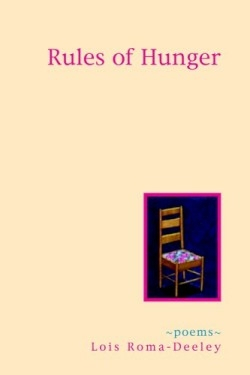Rules of Hunger
“Sliding over these days, peeling shadows off my heart. / My whole life is a slice of onion held to the light.” In this debut poetry collection, the voice cascades from knowing to wonder and back again. The poet uses poetry as a tool to celebrate both triumphs and defeats. It is a mirror as well as a shroud.
Roma-Deeley has been published in six anthologies, including the American Book Award winner Looking for Home. Her poems have appeared in several literary journals such as Faultline, Iris, and Controlled Burn. She is poet-in-residence at Paradise Valley Community College in Phoenix, Arizona. That state’s arid landscape figures prominently in her work. Sometimes, it is juxtaposed with the place that formed her: North Babylon, New York, a working-class enclave of “ethnic” residents who steep themselves in their religion, their food, their families. It is this purlieu that not only flavors these forty-six poems, but also gives them their center.
Told from the points of view of three generations of women, the poems capture the great effort of the immigrant experience, specifically that of Sicilian Americans, although any reader who has struggled to fit into the mainstream, who has ever felt other, will be able to relate.
In “North of Babylon,” a woman leaves the familiarity of her home, a city that “was built with more walls than / gates,” for a new life in a new town. There’s danger in this relocation, the danger her fearful imagination conjures, and the tangible, symbolic danger of a gun she has stolen “from someone’s back pocket.” It does not matter whose pocket-although one may conjecture it’s someone she knows intimately. What is at the core is her sense of protecting herself from the unknown. The speaker possesses the resolve to face whatever may come her way, and face it well armed.
The summer sky, “a holocaust of light,” bears witness to the convergence of industry and nature in “Crossing the Desert,” one of the shortest poems in the collection. There’s a puzzling fuzziness to this poem- quite frankly, a reader might wonder what it means. It is, however, the esoteric nature of the work that makes it accessible. One might decide that the railroad is a metaphor for progress, as it rolls towards the city, defying the killing desert heat. Humankind has harnessed a livelihood out of an unforgiving landscape. That nothing is impossible seems to be the idea.
No matter the poet’s intent, one thing is clear. It’s the notion of conquering anything-the real obstacles of poverty and prejudice or the imagined ones of inadequacy and unworthiness-that threads these poems together into a coherent whole.
Disclosure: This article is not an endorsement, but a review. The publisher of this book provided free copies of the book to have their book reviewed by a professional reviewer. No fee was paid by the publisher for this review. Foreword Reviews only recommends books that we love. Foreword Magazine, Inc. is disclosing this in accordance with the Federal Trade Commission’s 16 CFR, Part 255.

